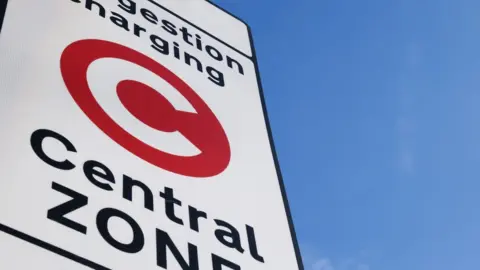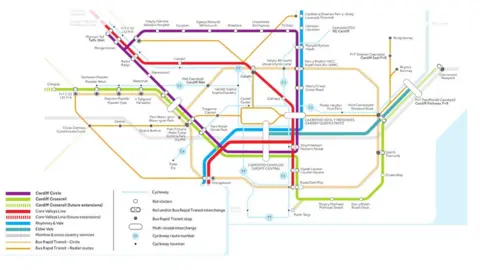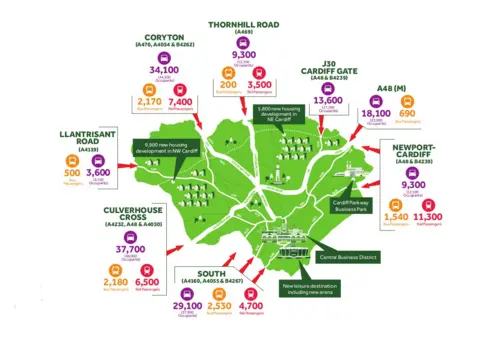Cardiff congestion charge: 'Not tax on valleys'
 Getty Images
Getty ImagesA potential congestion charge for driving into Cardiff is not a tax on those living in the valleys, its city leader has insisted.
Cardiff council plans to charge non-residents in a bid to hit green targets and cut congestion.
Council leader Huw Thomas said it would fund better public transport.
But Blaenau Gwent's assembly member Alun Davies warned his constituents should not be told "they must fund Cardiff council's policies".
A proposed £2 charge could be introduced by 2024, with the charging zone boundaries under discussion.
The Welsh capital would join London and Durham which charge motorists to drive into the centre, while Birmingham, Edinburgh and Manchester have been considering the move.
The council's discussion paper on its vision for transport in the city to 2030 was published on Wednesday, promising a "serious debate about the problems the city is facing".
"We've got a transport system that was obsolete in the 1980s," Mr Thomas told BBC Radio Wales' Breakfast show on Thursday.
"We've got a city that's designed for a population of 200,000, and yet with commuter swells every day, it becomes a city of half-a-million people. And the transport system is not fit for purpose.
"This plan is about recognising that, putting in place a vision to change that for good."
 Cardiff council
Cardiff councilMr Thomas said there needed to be "an honest conversation" about how the money was raised to implement changes and improve the public transport network.
"That's why we are proposing a congestion charge is potentially one of the options we would look at in terms of raising that revenue."
The council wants to see the South Wales Metro plans "supercharged" with new tram-train lines, opening new stations, rapid bus routes and segregated cycle lanes in the city.
Proposals would also include new park-and-ride facilities at the east and west of Cardiff - at junction 32 and junction 33 of the M4 motorway - and another at the planned Cardiff Parkway mainline station at St Mellons.
 Cardiff council
Cardiff council
The estimated cost of upgrading the public transport offering for the capital over the next decades has been put at between £1bn and £2bn.
Mr Thomas said any congestion charge would only make up part of the funding mix, matched by cash from the council and other sources, including the Welsh Government.
But asked whether a charge amounted to a tax on those living in commuter areas of the south Wales valleys, Cardiff's council leader responded: "Not at all."
"The irony is for some of the poorest communities - wherever you live in Wales - you cannot afford to buy a car, so you are already totally reliant on public transport," added Mr Thomas.
"What we would be doing is putting in place alternatives to using the car, and have this go live before any charge came into place."
Allow X content?

However, while Labour AM Mr Davies described the vision as "great" on social media - he also voiced concerns, adding: "Cardiff must not try to force others to pay for it."
And Rhondda Cynon Taf council leader Andrew Morgan said he wanted to make sure "funding that's raised in Cardiff by our residents from across the valleys travelling into Cardiff for work is evenly distributed, so there are alternatives."
